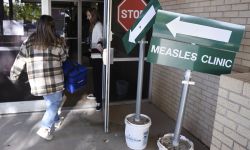Insomnia, flashbacks hitting Michigan hospital workers as coronavirus ebbs

The nurse’s husband woke her up the night she started screaming in her sleep.
“I was crying.” she said. “I cannot remember what the dream was about, but it was so real.”
After months of working night shifts on the COVID-19 unit at a Beaumont Health hospital in metro Detroit, the nurse said the adrenaline of the initial surge has faded. And while that’s brought some relief, what’s left is a new, persistent sense of anxiety.
Lately, the nurse (who asked not to be named because she was not authorized to speak with the media), finds herself getting “prickly” and irritable at home. Focusing is hard, due to recent bouts of insomnia. At night, her mind runs through a relentless loop of anxieties.
“What if my husband died? What if my kids die? What if my kids get this new disease that is happening?...What about if I brought it home?... What if there is a second wave? Which I kind of feel that there might be.”
A worsening wave of trauma
The novel coronavirus’ grip on Michigan has loosened in recent weeks amid a steady decline in the daily rate of new confirmed infections. On Wednesday, Michigan recorded 304 new cases.
But as front-line workers emerge from months of warlike chaos in their workplaces, mental health experts are already noticing a massive surge in mental health needs among a traumatized workforce.
- The latest: Michigan coronavirus map, curve, chart, updated COVID-19 news
- Dashboard: Michigan coronavirus testing numbers, trends, COVID-19 data
- June 1: Whitmer lifts stay-at-home order, will allow bars and restaurants to open
- What Whitmer’s new coronavirus order means for Michigan summer plans
The pace of viral infection may have slowed, said Brenda Szalka, manager of the employee assistance program at Henry Ford Health System, but “the emotional impact of it is not better. It's more intense right now.”
Get involved
Detroit Free Press, Bridge Magazine and Michigan Radio are teaming up to report on Michigan hospitals during the coronavirus pandemic. If you work in a Michigan hospital, we would love to hear from you. You can contact Kristen Jordan Shamus atkshamus@freepress.com, Robin Erb at rerb@bridgemi.com or Kate Wells at Katwells@umich.edu at Michigan Radio.
Addressing those needs will require a monumental effort from a health care system that, historically, has fallen far short of addressing workers’ mental health needs.
“In the past, health care systems have not done a good job at all,” said Jed Magen, chair of the Michigan State University Department of Psychiatry. “In fact, they’ve minimized the stress and strain on health care workers.”
Even before the pandemic, unmet mental health and wellness needs were a major challenge in healthcare professions, Magen said, driven largely by an institutional culture of stoicism and self-reliance, and a prioritization of productivity at all costs.
One review, before the coronavirus struck, described burnout as “rampant” within the industry, with more than half of physicians and a third of nurses experiencing symptoms. Other studies have found high rates of depression among medical professionals, as well as dramatically higher rates of suicide compared to the general population.
Experts say they worry those numbers will jump even higher in the wake of the pandemic, possibly contributing to a mass exodus of workers from health care professions.
“People who are in the middle or toward the end of their career are going to say ‘this isn’t worth it,’” Magen said.
Health care experts expect an increase in suicides, post-traumatic stress disorder, anxiety and other mental health conditions — a toll already seen in places like New York City, where Dr. Lorna M. Breen, an emergency department medical director treating COVID-19 patients at NewYork-Presbyterian Allen Hospital, died by suicide in late April.
Responding to an ‘explosion of need’
The sudden wave of widespread worker trauma has mental health professionals and health care systems scrambling to respond.
“This whole thing has just created an explosion of need,” said Erin Barbossa, an Ann Arbor therapist who helped establish MI Frontline Support, an online directory of about 400 mental health professionals willing to take new patients who work on the front lines. Some of the therapists require payment, while others have offered pro-bono services for front-line workers who lack insurance or ability to pay.
After Wayne State University’s school of social work and college of nursing launched a mental health hotline for traumatized doctors, nurses, and other first responders in the early days of Michigan’s COVID-19 experience, a common theme emerged in the calls, said Suzanne Brown, an associate professor in social work at the school: Front-line workers are suspended in a state of stress that is both “acute and chronic.”
Hospital staff and first responders are used to dealing with crises. But typically, they address the immediate need — an emergency surgery, a horrific accident scene — and move on to a new task. But with COVID-19, Brown said, the trauma lingers along with the pandemic.
“That sense of not knowing when it’s going to end leaves very little room for people to recover,” she said.
Dr. Rana Awdish, a pulmonologist and the director of medical care at Henry Ford Health System, said many of her colleagues don’t understand why they’re not experiencing a greater sense of relief. The curve has flattened, she said, but Awdish and her colleagues live in fear of a second wave of infections.
“We exhausted a lot of our reserves,” she said, “and there's more to come.”
On top of the seemingly indefinite nature of the crisis, workers are now dealing with stress that bleeds into their personal lives. They spend days at work watching patients die despite their best efforts, then worry they’ve brought the virus home with them. And for the many health care workers who’ve chosen to isolate from their family, that distance creates its own strain.
Amy Maya, a nurse educator at McLaren Health Care, has to settle for “virtual hugs” with her three teenagers these days. They made an exception on Mother’s Day.
“I went over and threw blankets over them, and just held them and cried,” she said. “Because it was the first time I touched my kids in months.”
Maureen Biddinger-Grisius, a nurse who has treated COVID-19 patients at Beaumont Hospital in Farmington Hills, can’t shake the feeling of the pandemic’s early days, when the hospital had begun offering drive-through virus tests in its parking lot. Biddinger-Grisius watched from inside the hospital as the line of cars grew until it wrapped around buildings. She knew many of those who tested positive would soon check into the hospital.

“It felt like you were standing on a beach and watching this tidal wave coming toward you,” she said, “and there was no way to brace for it.”
Biddinger-Grisius got through the worst days by taking time each morning to reflect on the good things in her life.
“Some days it was little things, like, ‘I can hear the birds chirping, so spring must be coming,’” she said. “But at the end of the day, you would still cry.”
At Henry Ford, health care workers’ concerns have evolved, Szalka said, from having enough personal protective equipment or finding childcare, to grappling with a combination of “intrusive thoughts” and physical symptoms such as headaches, muscle tension, irritability and forgetfulness.
Employees have told Szalka they can’t remember what they had for breakfast. Or they’ll finally get a day off to relax or be with family, “and then it’s 5 o’clock and they’re still in their pajamas. And they haven’t gone outside yet because they just can’t.”
Speaking from her home while her oldest entertained the younger kids in the next room, the Beaumont night-shift nurse said she’s been having flashbacks.
She gets “goosebumps” thinking about the shifts when the calls for intubations and resuscitations over the hospital’s PA system never seemed to stop. She also thinks about the patients she sat with for hours, holding their hands, praying with them before they died, often with an iPad on hand so family members could say goodbye.
“I was trying to limit my exposure as much as I could,” she said. “But how can you leave somebody to die alone?”
‘Zen dens’ and Zoom therapy
In the months since COVID-19 arrived in Michigan, some hospital systems have launched new programs to boost workplace mental health care offerings.
McLaren is offering support groups and webinars. There are “zen dens” with yoga mats, zero gravity chairs and sound machines. And at the health system’s Flint hospital, Dr. Nicole Franklin, a behavioral health psychologist, was reassigned to provide on-the-job “psychological first aid” to front-line workers.
At Henry Ford, virtual support groups are available as often three times a day, with topics ranging from dealing with grief, coping when a family member loses a job, or handling COVID-related stress. There are virtual guided meditation sessions, a 24-hour emotional support hotline, with more staff have been brought on to handle virtual counseling appointments.
Detroit Medical Center has a virtual “emotional support group” offering tips on self-care and dealing with uncertainty. Summar Reslan, a clinical neuropsychologist at the DMC Rehabilitation Institute of Michigan, started the group and releases the sessions as podcasts for colleagues who can’t make it or don’t feel comfortable admitting they need help.
At Beaumont, Michigan’s largest health care system, wellness staff have been reading case studies from the military — an institution familiar with the effects of mass trauma within its ranks — to better understand the toll COVID-19 has taken on Beaumont’s workforce. Hospital wellness leaders use a videoconferencing service to conduct small group therapy sessions with hospital staff, and Beaumont leaders have discussed offering extra time off for frontline workers to process and rest now that Michigan’s infection rate has slowed.
“The goal is to build some resiliency,” said Dr. Peggy Nowak, Beaumont’s director of physician wellness, and avoid tragedies like the suicide of New York doctor Breen. “We just cannot let that be what happens here.”
Those at the helm of these efforts admit they’re starting from scratch in an industry where worker wellness has not always been a priority. In the past, hospital workers and experts said, many health care systems’ mental health efforts amounted to little more than passing out business cards containing the phone number workers should call if they need help, or posting hotline numbers in break rooms.

Now, some hospitals say they’ve begun to take a more proactive approach.
Battling against a culture of silence
Providing options for workers is just one piece of the puzzle. Getting workers to use it could be even trickier, particularly given the deeply embedded workplace culture of silence.
“Many front-line workers are not used to asking for help,” said Brown, of Wayne State. “It’s contrary to their own kind of identity.”
The Beaumont nurse said she knows her hospital is offering support.
But she hasn’t accessed it, she said. She’s not sure why. Maybe it’s her busy schedule on the night shift, or that her kids demand whatever spare time she has. Or maybe it’s the shift to telehealth during the pandemic. Doing a virtual appointment, the nurse said, just doesn’t feel the same.
So she’s coping the way she always has: cracking dark jokes with fellow nurses, who are the only people she feels really get it.
“Everybody has to use humor to get through things,” she said. “But it was kind of like, the humor was like, ‘Oh, shit, I hope I don’t die.’”
Pushing past that resistance will be a challenge.
Dr. Nicole Franklin, the clinical health psychologist at McLaren, said one individual called her for help — but was wary. “‘This is the first time I’ve ever reached out; that means this is hard for me,’” the person told her. “‘And I don’t know how people are going to think of me, because I had to reach out.’”
Experts say the key is persistence.
Rather than asking front-line workers to seek help on their own, employers should proactively offer opportunities to process trauma and practice wellness, ideally during work hours.
Ultimately, said Magen, the MSU psychiatrist, hospitals must move beyond virtual meetings and other discreet offerings, and start working to shift hospital culture to eliminate the collective shame associated with seeking mental health help.
“You’ve got to be like a broken record,” he said, emphasizing repeatedly over months and years that addressing worker trauma is a priority.
For Franklin, that meant doing the same work as the very employees she wanted to help. She built trust among frontline workers by embedding on a COVID-19 unit at McLaren Flint.
“So while they were coming out of a room after losing a patient, or making a phone call to a family member that was difficult, I was there to provide them with support techniques and help walk them through that,” Franklin said. “And when they started realizing the benefit of it, then they began to be more willing to participate.”
Maya, the nurse educator at McLaren, said she’s been practicing what she’s preaching.
“Honestly? I sought mental health treatment,” she said. “I finally broke down and called my doctor and said, ‘Listen, I'm going to need a little support through this.’”
See what new members are saying about why they donated to Bridge Michigan:
- “In order for this information to be accurate and unbiased it must be underwritten by its readers, not by special interests.” - Larry S.
- “Not many other media sources report on the topics Bridge does.” - Susan B.
- “Your journalism is outstanding and rare these days.” - Mark S.
If you want to ensure the future of nonpartisan, nonprofit Michigan journalism, please become a member today. You, too, will be asked why you donated and maybe we'll feature your quote next time!








